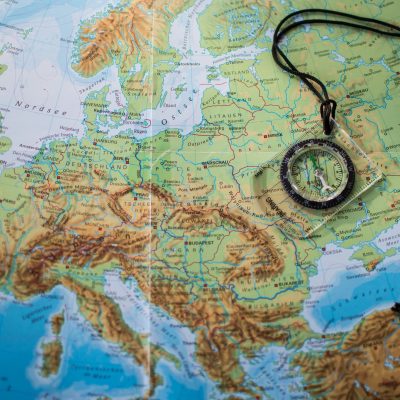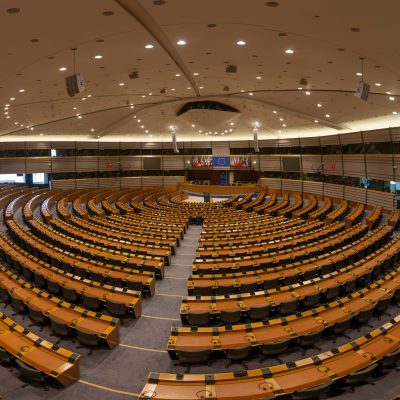France’s questionable arguments against EU enlargement

Why the French government should rethink its veto on the EU accession talks with North Macedonia and Albania, while pushing for reform of the accession procedure.
In October 2019, France vetoed the opening of EU accession talks with the Balkan countries North Macedonia and Albania. In a number of different press releases and public statements, the French government brought forward two principal arguments justifying its opposition. These points were (1) the perceived need to reform the accession procedures before any new countries can join the EU, and a supposed (2) trade-off between the widening and deepening of the EU more generally.
This blogpost has a closer look at the arguments raised by the French authorities and subjects them to a ‘reality check’. While acknowledging the value in re-thinking the existing accession procedures and calling for broader EU reform, the following sections show that the key reasons for the French veto of EU accession talks with North Macedonia and Albania have to be seriously questioned. Building on this, the blogpost urges the French government to rethink its position and allow for the opening of the accession procedures.
On the necessity to reform the EU accession procedures before new countries can join
The first argument of the French government justifying its veto for EU accession talks with North Macedonia and Albania is the necessity to reform accession procedures before any new countries can join. This line of reasoning is based on the observation that the EU has made ‘bad experiences’ with recent EU enlargements to Central and Eastern Europe. Autocratic tendencies in Poland and especially Hungary, as well as persistent problems with corruption in countries such as Romania and Bulgaria have put pressure on the EU’s commitment to liberal democracy and the rule of law. The French government views this situation as the result of ‘unprepared’ countries entering the EU, subsequently causing problems for fundamental EU principles and values. To avoid this for the future, particularly France is convinced of the urgent need to reform the EU accession procedure before any new accession talks are opened.
Following its veto, and curiously not before this, the French authorities have circulated a non-paper with a reform proposal for the EU accession procedures. The French position, as laid out in the document, consists of making this process less bureaucratic, less automatic and more political. The non-paper proposes to (1) formulate stricter conditions in order to allow for a more effective and long-term approximation to European standards and norms (in terms of the rule of law and economic/social convergence), to (2) base negotiations on different policy blocks, through which candidate countries could get progressively associated to the EU, to (3) reform the process so that it would link concrete benefits to this progressive association, and to (4) make the negotiation process reversible, which would render the fulfilment of accession criteria more credible and increase the incentives for candidate countries to ‘stay on track’.
But while the overall thrust of these French proposals to reform the EU accession procedure is certainly to be welcomed, linking it with a veto of the opening of accession talks with North Macedonia and Albania is a questionable strategy.
First, both North Macedonia and Albania have made considerable efforts to comply with the European requirements to start the EU accession procedures, with the European Commission confirming the fulfilment of the necessary measures. Particularly North Macedonia’s political leadership (as well as the Greek government) ‘spent’ an enormous amount of political capital by changing the name of the country in order to overcome Greek opposition. If the proposal of the French government aims to improve the credibility and incentives of the EU accession process, vetoing the start of accession talks after comprehensive domestic reforms in North Macedonia and Albania can do nothing more than undermine the country’s own objectives for the future of EU accession. Many studies have shown that candidate countries undertake the biggest reform steps when EU accession comes into reach. By blocking the start of accession negotiations, national governments in North Macedonia and Albania might prefer to ‘spend’ their political capital differently in the future.
Second, with its veto on the start of EU accession talks, France basically holds two candidate countries ‘hostage’ to get support from other EU member states for a broader reform. Given the continuous geopolitical importance of enlargement for the EU as a foreign policy tool, especially in the context of the Balkans, this strategy might work to bring a reform of the accession procedures on the political agenda in Europe’s capitals. At the same time, the position of the French authorities might further alienate their European partners.
But even reformed EU accession procedures won’t be able to resolve the problem of countries that begin to deviate from liberal democracy and the rule of law once they are EU member states. While a reformed process might help to better incorporate European norms and values before entering the EU, it will not be enough to ensure the conservation of democracy among EU countries once they have joined. As R. Daniel Kelemen shows in a new study on Hungary, a number of factors participate in the creation of an ‘authoritarian equilibrium’ for countries that are inside the EU:
“First, the EU’s half-baked system of party politics and its ingrained reluctance to interfere in the domestic politics of its member states help shield national autocrats from EU intervention. Second, funding and investment from the EU helps sustain these regimes. Third, the free movement of persons in the EU facilitates the exit of dissatisfied citizens, which depletes the opposition and generates remittances, thereby helping these regimes endure”.
What Kelemen’s analysis highlights is indeed the need for substantive EU reform to address these issues. A veto of the opening of EU accession talks and the demand for changes to the EU accession procedures will, however, hardly resolve them. When Hungary and Poland entered the EU in 2004, their political systems corresponded fully to the notion of liberal democracies. In comparison, Greece and Portugal had weaker democratic systems in place when they became EU members in 1981 and 1986 respectively. The latter nevertheless largely retained or even improved their democratic credence since EU accession, even if their transition from autocratic leadership to EU membership had been shorter than that of Hungary and Poland. Even if Hungary and Poland were more democratic when entering the EU and had a longer transition period, both countries have experienced a move towards more autocratic leaderships since the beginning of the 2010s. Rather than making EU accession procedures responsible for these developments, the EU and its member states need to finally make use of all the existing institutional means to react to the turn towards authoritarianism more forcefully. This also includes the need to innovate in terms of possible political and economic sanctions. The EU accession process itself is simply not adapted to deal with the autocratic threats among existing EU member states.
On the trade-off between further widening and deepening of the EU
The second and deeper argument of the French government supporting its veto of the opening of accession talks with North Macedonia and Albania is that there would be a trade-off between the widening and deepening of the EU. Given that there are different visions for Europe among (potential) EU member states for the future of EU, any further EU enlargement would render a deepening of EU integration increasingly difficult. Some countries, like the UK for example, have always understood the EU primarily as a project of economic integration, while others – including France – have largely supported the move towards a more political union over time. The French authorities have indeed a long-standing preference for deepening EU integration rather than further widening it.
The perspective of additional countries from Southeastern Europe joining the EU, which might have policy preferences closer to the Visegrád countries (Poland, Czech Republic, Slovakia, Hungary) rather than France, thus makes the French government’s reluctance to open further EU accession talks understandable. But at the same time, this logic only applies if there is actually a trade-off between the widening and deepening of EU integration, as has been a topic for repeated debate among political actors, bureaucrats and academics over several decades.
Recent research, interestingly, stresses that the widening of the EU does not necessarily impede the deepening of EU integration but can even support it and serve as a complement. Based on her analysis, Christina Schneider, for example, argues that
“the widening of the EU does not invariably present an obstacle to cooperation. Preference heterogeneity in the Council is not only affected by the accession of new member states, but it also fluctuates over time owing to changes in the domestic political arena. (…) Whereas income heterogeneity has increased with the increasing number of EU members, partisan heterogeneity has not been affected by EU enlargements, but rather by domestic political changes such as elections”.
Indeed, it depends very much on the heterogeneity of preferences among existing EU member states, if the accession of new countries would further increase the range of different visions for the future of Europe. Given the currently rather high degree of heterogeneity among EU member states, it is unlikely that North Macedonia and Albania would further complicate reform attempts towards the deepening of EU integration.
In addition, it is not only the number of EU member states that could explain the difficulties in EU deepening. It also depends on the relative size and importance of (potential) member states. With the UK, one of the largest EU countries, that has continuously blocked common attempts for more EU integration, is likely to leave the EU next year. This should actually considerably facilitate moves towards EU deepening in comparison to the status quo. The departure of the UK from the EU should more than compensate for the potential accession of North Macedonia and Albania, whose joint GDP accounts for less than 1 per cent of the UK’s GDP. And even if these two countries would be particularly skeptical towards additional EU integration, their small size makes it significantly easier for integration-promoting countries to overcome any potential resistance through side-payments.
A final objection to the French position against opening the EU accession talks regarding the supposed widening-deepening trade-off is that – in any case, North Macedonia and Albania would not join the EU immediately. Given that both countries’ political institutions still require a significant number of reforms before complying to all EU accession criteria, this process is most likely to take a full decade or even beyond that. Until then, there is plenty of time to negotiate a deepening of the EU without having to deal with additional vetoes from new member states. As pointed out above, with the imminent departure of the UK, there is actually a window of opportunity for further EU integration in the coming years, or at least for an adaptation of the EU’s institutional arrangements to facilitate deepening later on.
But as Schneider has highlighted, this depends strongly on the evolution of national preferences among the existing EU member states. Key reform attempts of the French government (with a particular focus on a strengthening of the Eurozone) have not necessarily been frustrated by the more recent EU members. From a French point of view, the main obstacle for EU deepening in recent years was rather Germany, and increasingly so since the Great Recession and the European debt crisis.
In view of all these arguments, blocking the start of EU accession talks with North Macedonia and Albania thus does not seem a suitable tool to address the current difficulties to drive forward the deepening of European integration. If anything, the national ‘solo effort’ of the French veto will further alienate its European partners and make compromise on EU reform less likely.
The way forward for France and the future of EU accession procedures
As shown in the two sections above, the key arguments of the French government for vetoing the opening of EU accession talks with North Macedonia and Albania do not withstand a critical ‘reality check’. Neither will a reform of the accession procedures be able to resolve the concerns about autocratic tendencies among European countries once they are EU member states, nor is there any inherent trade-off between the widening and deepening of EU integration, which rather depends on the varying degree of preference heterogeneity among key EU member states across time.
While the French proposals to reform the EU accession procedures and the call for further EU deepening are to be welcomed and should seriously be discussed in Europe’s capitals, there is no need to link these reform efforts with a veto on the accession talks with North Macedonia and Albania. The French authorities should withdraw their opposition as soon as possible to minimize the damage that has already been done in terms of EU credibility and to ensure that the West Balkans will continue to ‘spend’ their political capital on a path towards Europe. Given the heavy criticism and pressure from capitals across the European continent, the French government should develop a narrative that will help it to ‘save face’: allowing the EU accession talks to move forward (at the very least with North Macedonia) while claiming ‘victory’ for having kickstarted overdue debates on the exact accession procedures. The key elements of the French non-paper are surely an interesting starting point for such a discussion.




